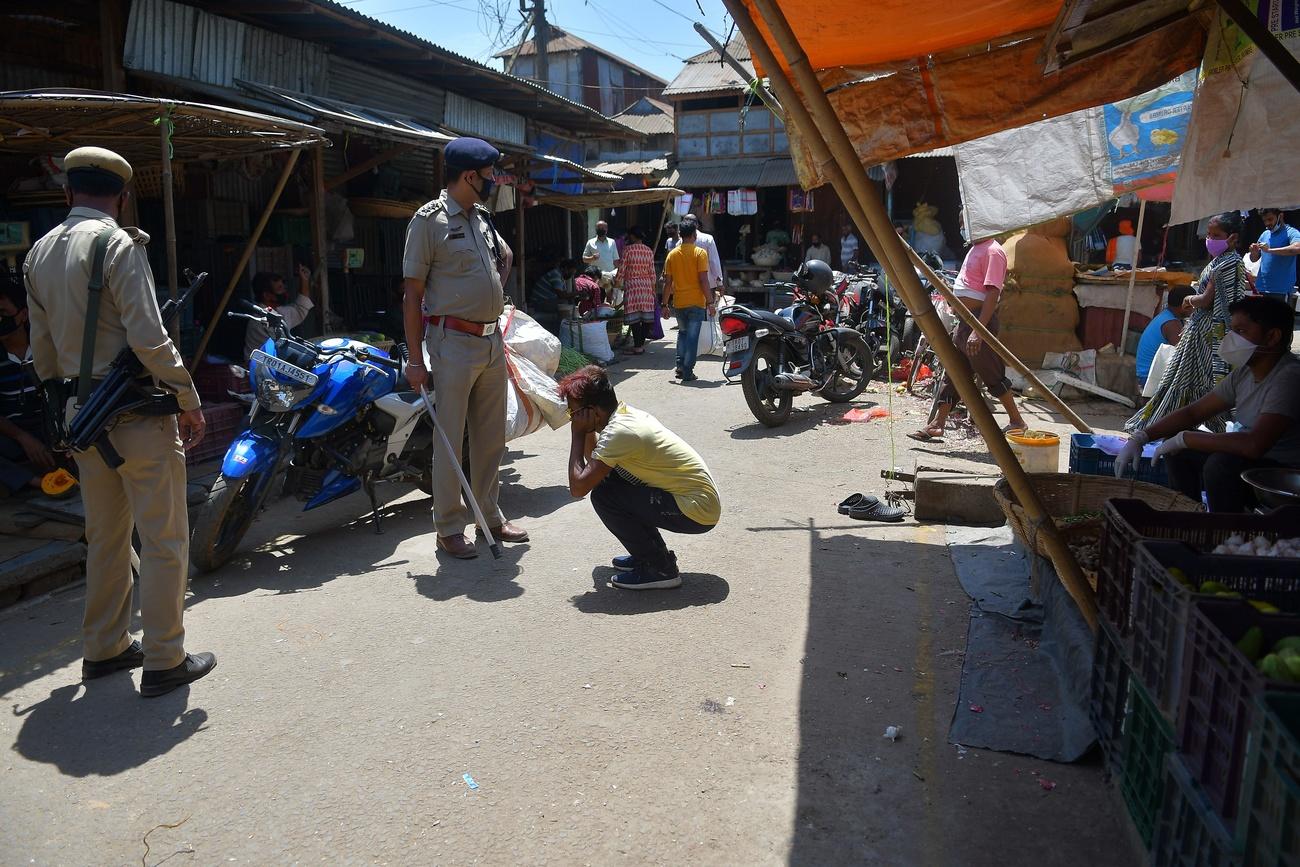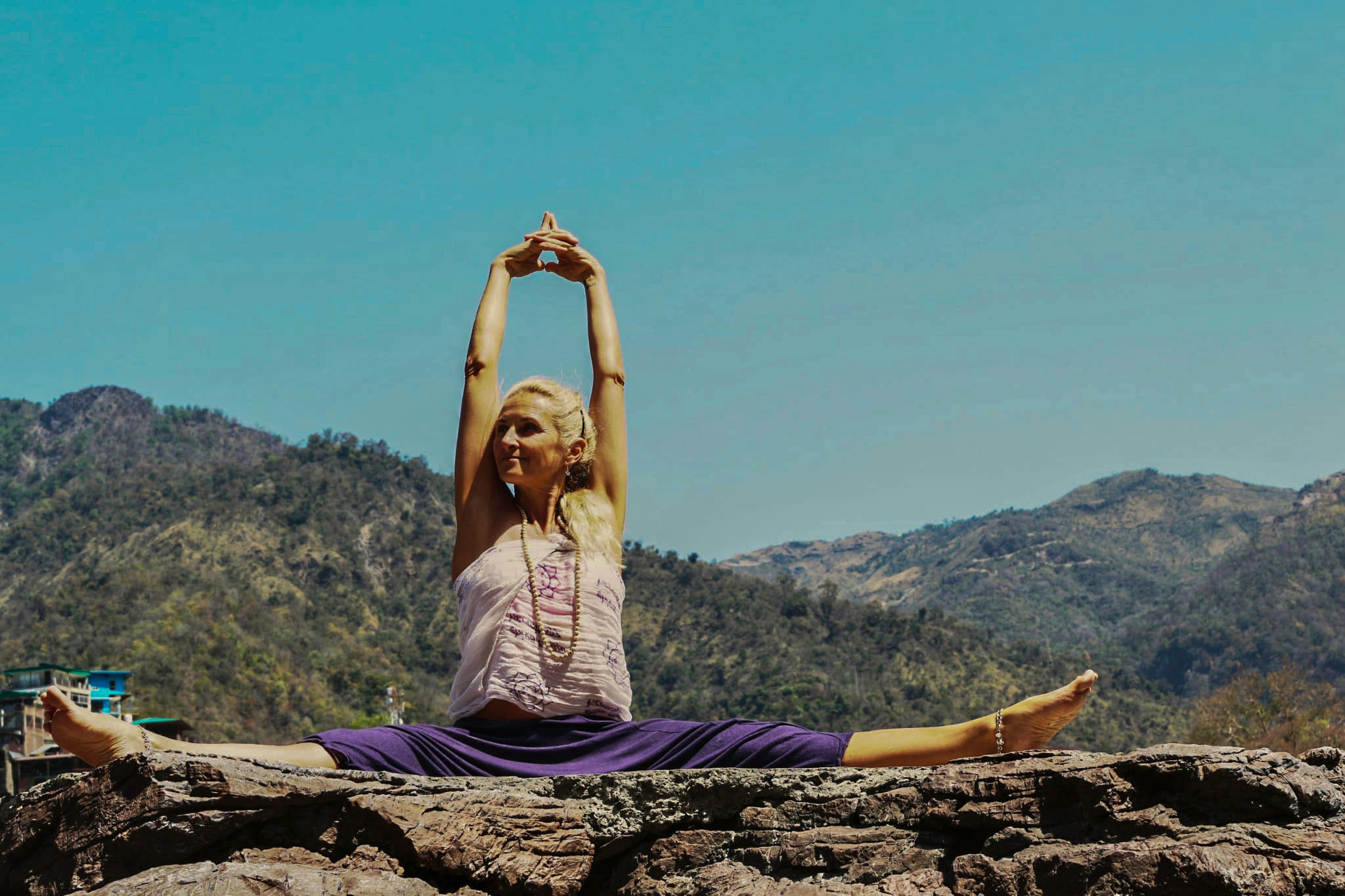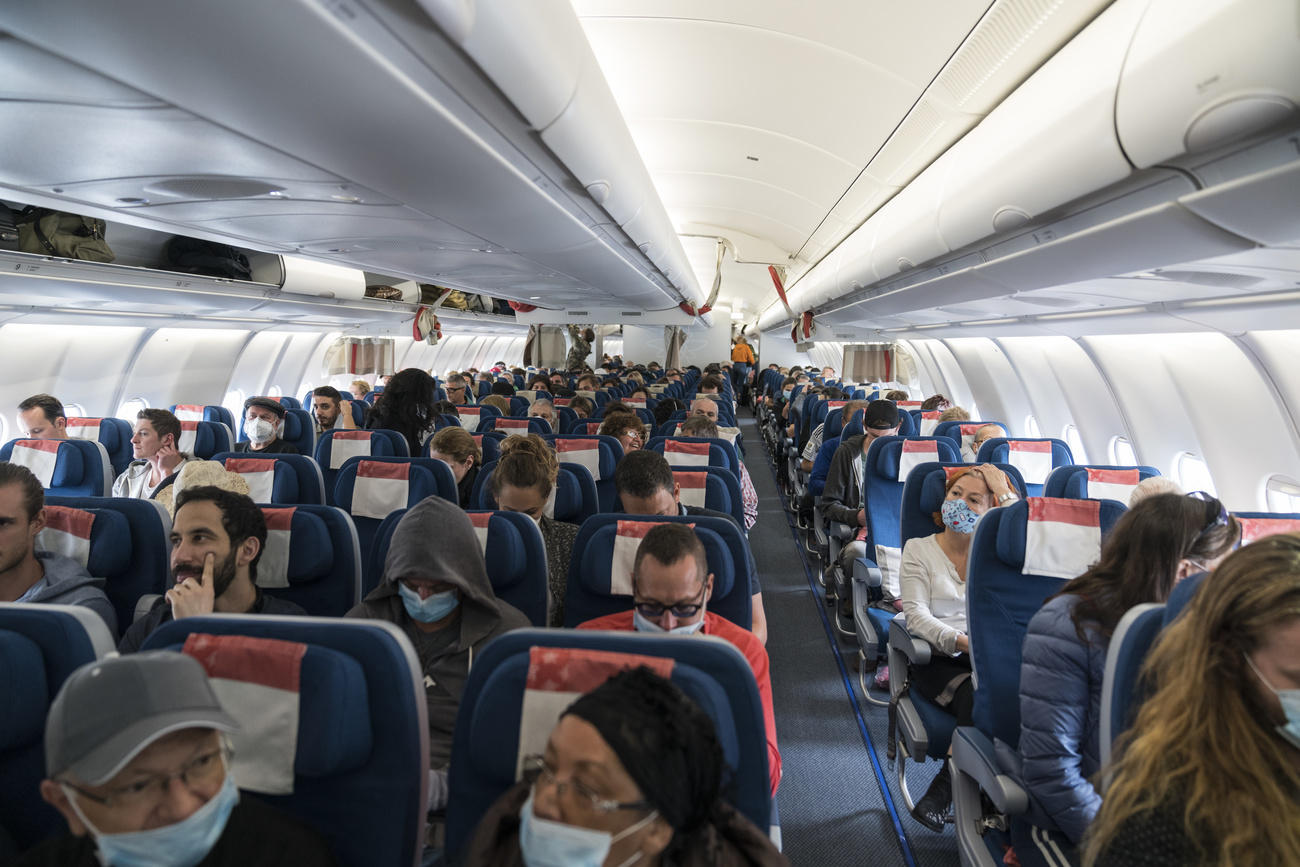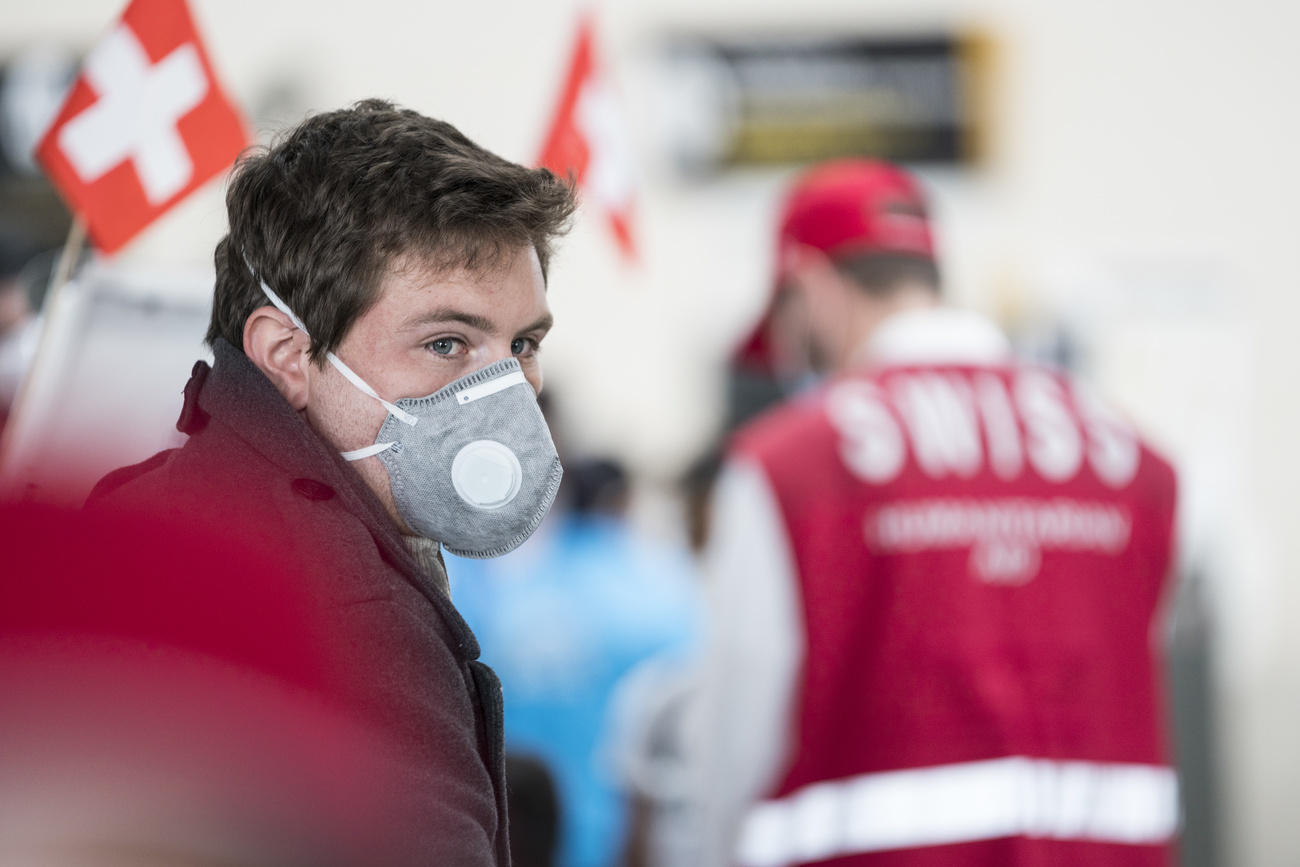How Swiss people are experiencing lockdown in India

Since March 25 some 1.3 billion people have been part of the world’s largest lockdown in India to combat the spread of Covid-19. A few hundred Swiss people were caught up in it, most of whom have since been repatriated. But some chose to stay.
In India, Swiss tourists last week took advantage of the last repatriation flight to Zurich. Organised by the Swiss government, it left Kolkata on April 25 and made a stopover in Kochi in southern India.
The Swiss embassy in Delhi says 534 people were able to reach Zurich from India on three repatriation flights: 234 Swiss citizens, 120 holders of residence permits and 180 citizens or permit holders from European Union (EU) member states and third countries. In addition, 95 Swiss citizens and permit holders reached Switzerland on flights organised by EU states.
Barbara Droux, a 51-year-old yoga teacher from Geneva, was one of them. She returned at the end of April on a KLM flight via Amsterdam. She had landed in Delhi on March 3 before leaving for Rishikesh, a town in the foothills of the Himalayas about 200km north-east of the capital. The yoga course she had signed up for was interrupted after the start of the Indian government’s lockdown and was cancelled permanently the next day.
“I was lucky because that day I changed guest houses. Using the only bridge to cross the Ganges river was then banned,” she says by phone in a taxi to Delhi. She was able to discreetly buy daily takeaway meals in a restaurant just a stone’s throw from her accommodation. At first the lockdown was between 7am and 10am, then until 1pm.
“We had to be careful that the police didn’t see us, because that restaurant wasn’t really authorised. We were allowed to move around – but solely to go food shopping. We never ran out of food,” she says.
Indian bureaucracy
At the beginning of April, Droux received two repatriation offers from the Swiss embassy in Delhi. But she turned them down. She already had a flight scheduled for April 13 with Turkish Airlines. It was postponed until April 19 before being cancelled for good. The Swiss embassy then offered her two flights with KLM, on April 26 or 28. She went for the earlier one. “It’s the third flight I’ve bought,” she says.

But she was not yet out of the woods. She still had to deal with Indian bureaucracy. A travel pass for her and her taxi driver was essential. Sent by the Swiss embassy, the document had to be filled out by the local police. It then had to be returned to the Swiss representation, which would have it validated by the Indian authorities.
“In a WhatsApp group of stranded tourists I couldn’t find anyone to share the transport costs. I couldn’t fill out the document before the four-day deadline. The embassy warned me on Saturday that it would be too late and I was already thinking that I’d lose my flight again,” she said.
But the manager of her guesthouse gave her a hand and took her to the police station. He sorted out all the necessary documents. “Without him, I’d still be in Rishikesh,” Droux says. In the end, she feels she was luckier than some tourists in southern India who have been victims of racism (foreigners have been seen by some as responsible for bringing the virus into the country). Rishikesh was like a cocoon for her.
Hidden symptoms
Unlike Barbara Droux, another Swiss woman – who prefers to remain anonymous for personal reasons – decided to stay in India. The thirty-something from Lausanne had left Switzerland last August because of health problems. She came to India in the hope of getting better through yoga. After three months of study in Rishikesh, she continued her training in Goa, where she stayed for three months.

More
Huge repatriation operation draws to an end
A week before the lockdown was announced, she flew back to Rishikesh to continue her studies. “This has been a very difficult time for me. Five days before my trip, my lungs hurt and I had a sore throat. In Goa there were quite a lot of people and I was afraid I’d caught the coronavirus,” she says by phone.
These health problems lasted 24 days. To treat herself, she resorted to alternative medicine and followed the recommended measures of distance and hygiene.
“I was on my guard while no case of coronavirus had been reported in Rishikesh. In fact, I couldn’t tell anyone about my symptoms. I had to avoid being quarantined, because in India that wouldn’t have been much fun,” she says.
Anti-Western feeling
When she passes a group of Indians, she sometimes hears one of them mutter “Corona”. Then they put on their masks. “In this small farming village next to Rishikesh most people don’t know much about the virus. Their reaction to strangers is fear linked to ignorance,” she says.
Having recovered, she looked after the homeless. With other tourists, she organised fundraisers on Facebook to distribute food. She says she went through some highs and lows during the early days of the lockdown. One day hope, the next day pessimism.
“We feared the economy would collapse; we were afraid that racism towards foreigners would become unbearable. A lot of people come here during the high season from all over the world. I was convinced that cases of coronavirus were going to explode. That hasn’t happened, but this week people tested positive for the first time. Our travel is more limited,” she says.
Stay or go? It’s a question she has asked herself dozens of times, just like the other Swiss from Rishikesh in a WhatsApp group. “Everything can change overnight, but I’m happy here despite the lack of comfort compared with Switzerland,” she says.
Uncertainty
Christophe Perrin, 40, has lived in Mumbai with his Indian wife for nine years. The couple’s world has really been shaken up. Gaia Gourmet, their home-catering business, ceased all activity overnight.
“Our business was doing very well until the crisis. We’re well known in Mumbai. We served companies, consulates and Bollywood actors. But as all events have stopped, we had to close our business on March 18, a few days before the government announced the lockdown. We’ve asked our employees to take their holidays and we’re paying them their salaries,” Perrin says by phone.

He and his wife are thinking about the future of their business. He feels that it will have to adapt, as it will take time before people start gathering again for parties.
“We’ll probably have to get into the home-delivery business. That way, we’ll be able to get our team, which normally comprises about 15 permanent employees, working again. But we’re not sure. We hope it will work. In any case, I don’t think home parties will restart until Diwali [a major Hindu festival in November],” he says.
Outside of the business, he’s calmly living in lockdown with his wife and two-year-old daughter. He goes out only to buy food, at the bottom of his building where a lorry delivers rice and vegetables. He can also rely on the stocks he has been able to take home.
“We’ll remain closed until the end of May. I don’t want to take any risks with my employees. Before we get going again, they will all be tested,” he stresses.

More
Coronavirus: the situation in Switzerland
(Translated from French by Thomas Stephens)

In compliance with the JTI standards
More: SWI swissinfo.ch certified by the Journalism Trust Initiative










You can find an overview of ongoing debates with our journalists here . Please join us!
If you want to start a conversation about a topic raised in this article or want to report factual errors, email us at english@swissinfo.ch.